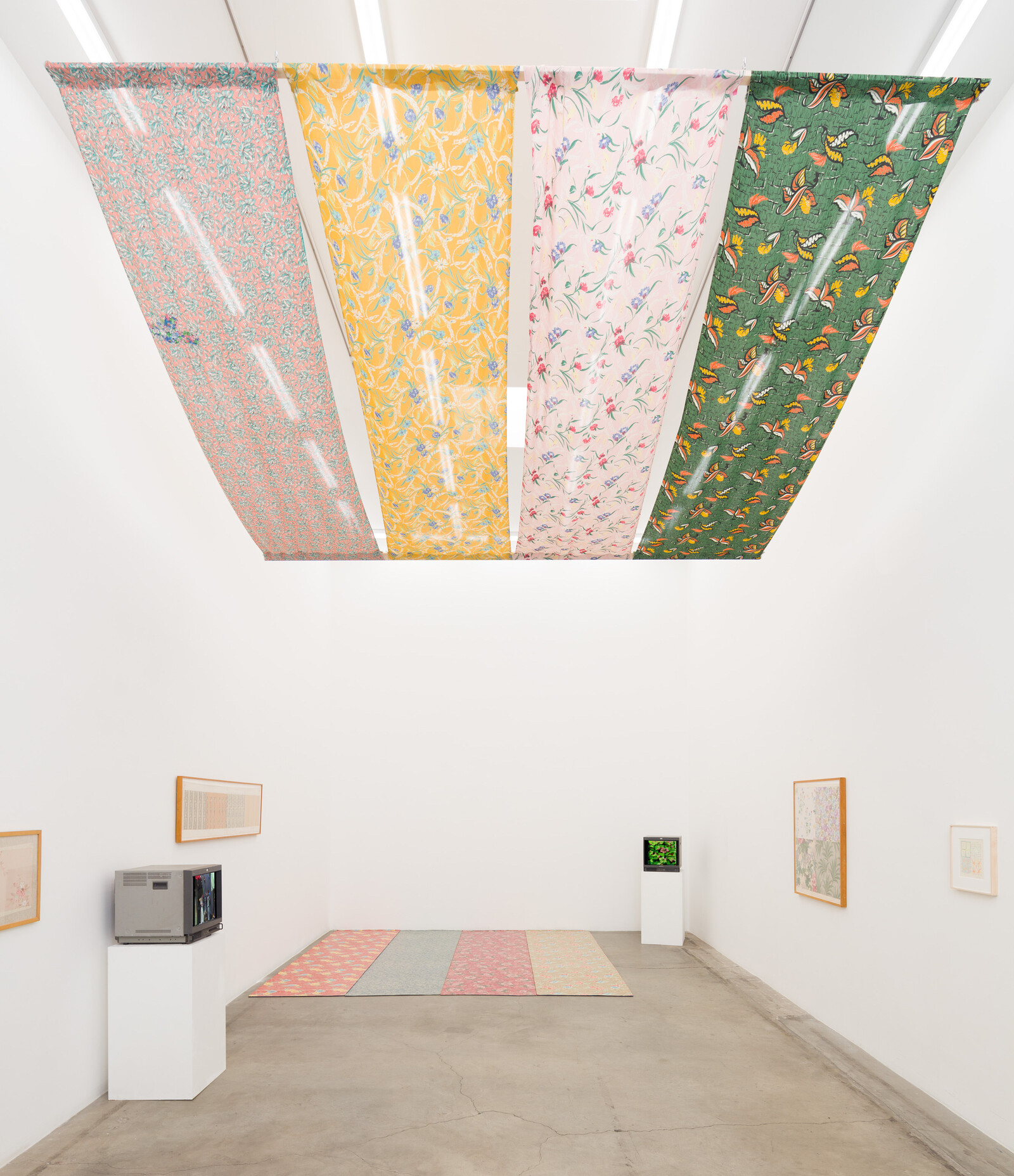A Place That Has No Name: Early Works
February 22–March 28, 2020
Anat Ebgi is pleased to announce A Place That Has No Name: Early Works, Tina Girouard’s first solo exhibition in Los Angeles. The exhibition will run from February 22–March 28, 2020.
Giouard’s participation in, and influence on, the SoHo art scene of the 1970s, with its growing cultural significance represents an elusive social energy of the period—marked by the spirit of collaboration, do-it-yourself methods, and a willingness and commitment to dispense with limitations: aesthetic, conceptual, and political. She countered the austere minimalist art being made at the time with exuberant color, eclectic compositions, and unorthodox materials. Eschewing any kind of media specificity in her performances, videos, paintings, and installation pieces, Girouard works with anything from silk fabrics, tapestries, wallpapers, to rolls of linoleum and tin tiles. Her work is as varied as her imagination, and the materials and ideas she uses are charming and accessible, ordinary and profound, revealing the genius and magic of her mind.
Girouard rose to prominence among a group of artists who arrived on the downtown scene around the same time including Lynda Benglis, Gordon Matta-Clark, Deborah Hay, Mary Heilman, Richard ‘Dickie’ Landry, Mabou Mines, Richard Serra, and Keith Sonnier. During the late 60s the Chinatown loft she shared with Dickie Landry and the Philip Glass Ensemble quickly became a symbolic home for a growing community of young artists that had also migrated to NYC. As an important member of this core group of artists that established the SoHo art scene, Girouard was a founding participant of 112 Greene Street Gallery, The Anarchitecture Group, Clocktower Gallery, FOOD restaurant, PS1, Holly Solomon Gallery, Creative Time, and The Fabric Workshop.
Girouard grew up on a rice farm in Louisiana “between De Quincy and Lake Charles, in the country, a place that has no name.” Girouard’s work finds itself in a similarly unique non place, permeating several movements. Her works are connected to the post-minimalists, but also deeply associated with the Pattern and Decoration movement in New York. Her work is strongly intertwined with feminist art history, with her consideration of domestic space and the “women’s work” that has become indicative of her practice. Rethinking and reworking art into something increasingly unpredictable and uncategorizable, ever close to life itself, Girouard exploits the porousness of these classifications, occupying and dissolving between several different modes.
Tina Girouard (b. 1946, DeQuincy, LA) has an exhibition history that includes a 1983 mid-career retrospective mounted at the Rufino Tamayo Museum in Mexico City, and international events such as the 1980 Venice Biennale, the 1977 Paris Biennale, 1977 Documenta VI and 1972 Documenta V, Kassel. Girouard’s work has been exhibited widely at galleries and museums including: Leo Castelli Gallery, The Kitchen, Walker Art Center, New Orleans Museum of Art, Museum of Contemporary Art Chicago, Palais des Beaux-Arts Brussels, Holly Solomon Gallery, David Zwirner, the Museum of Contemporary Art Los Angeles, and the New Museum. Girouard currently has works on view at MOCA Los Angeles for the exhibition With Pleasure: Pattern and Decoration in American Art 1972 – 1985 curated by Anna Katz and the Ludwig Museum Budapest for the exhibition Pattern and Decoration. Her work is in the permanent collections of the Hessel Museum of Art, Center for Curatorial Studies, Bard College, Annandale-on-Hudson, NY; Institute of Contemporary Art, University of Pennsylvania, Philadelphia, PA; Ludwig Forum fur International Kunst Aachen, DE; Rufino Tamayo Museum, Mexico City, Mexico; and Stedelijk Museum Actuele Kunst, Gent, Belgium. Girouard lives and works in Cecilia, LA.
